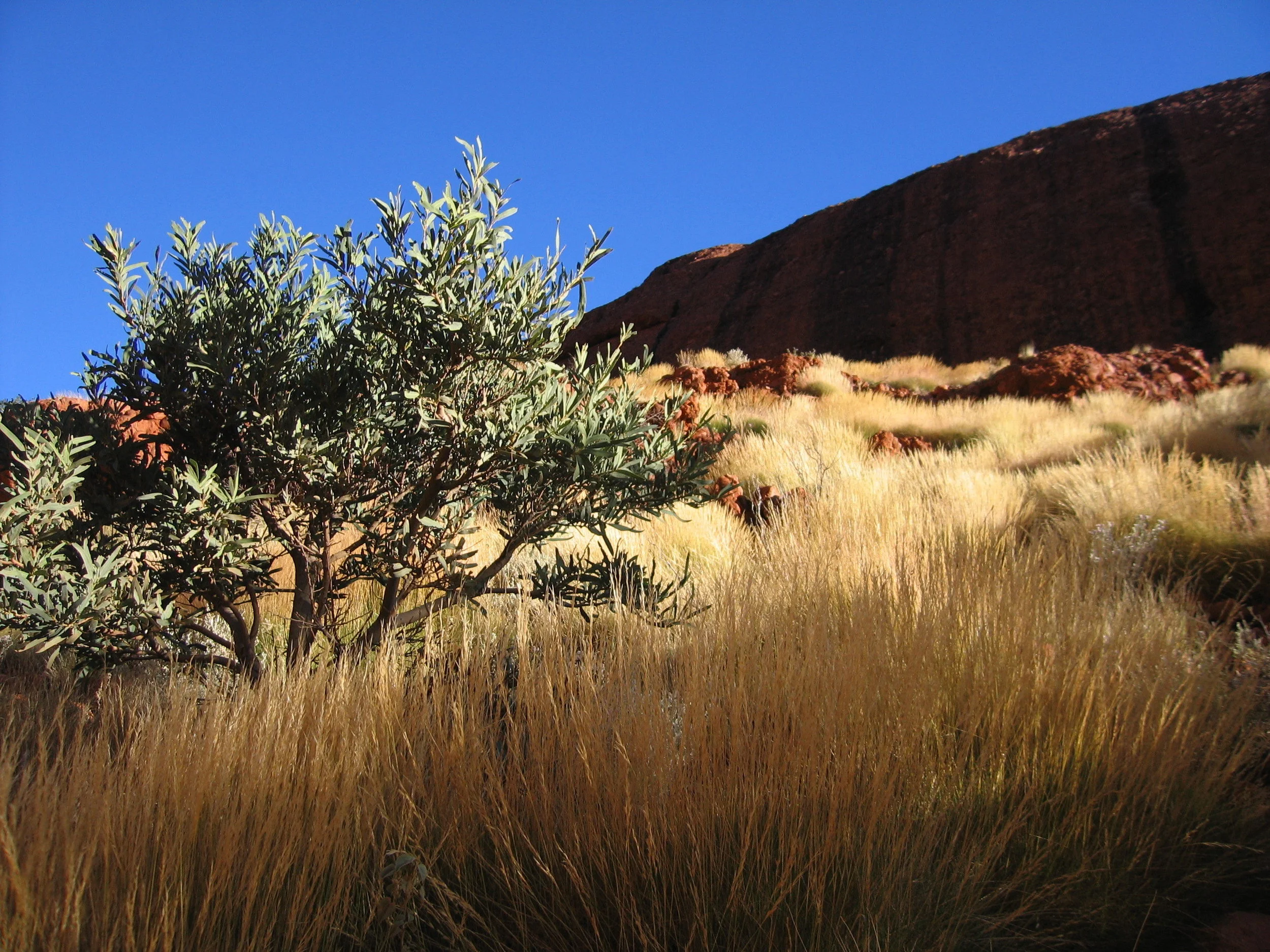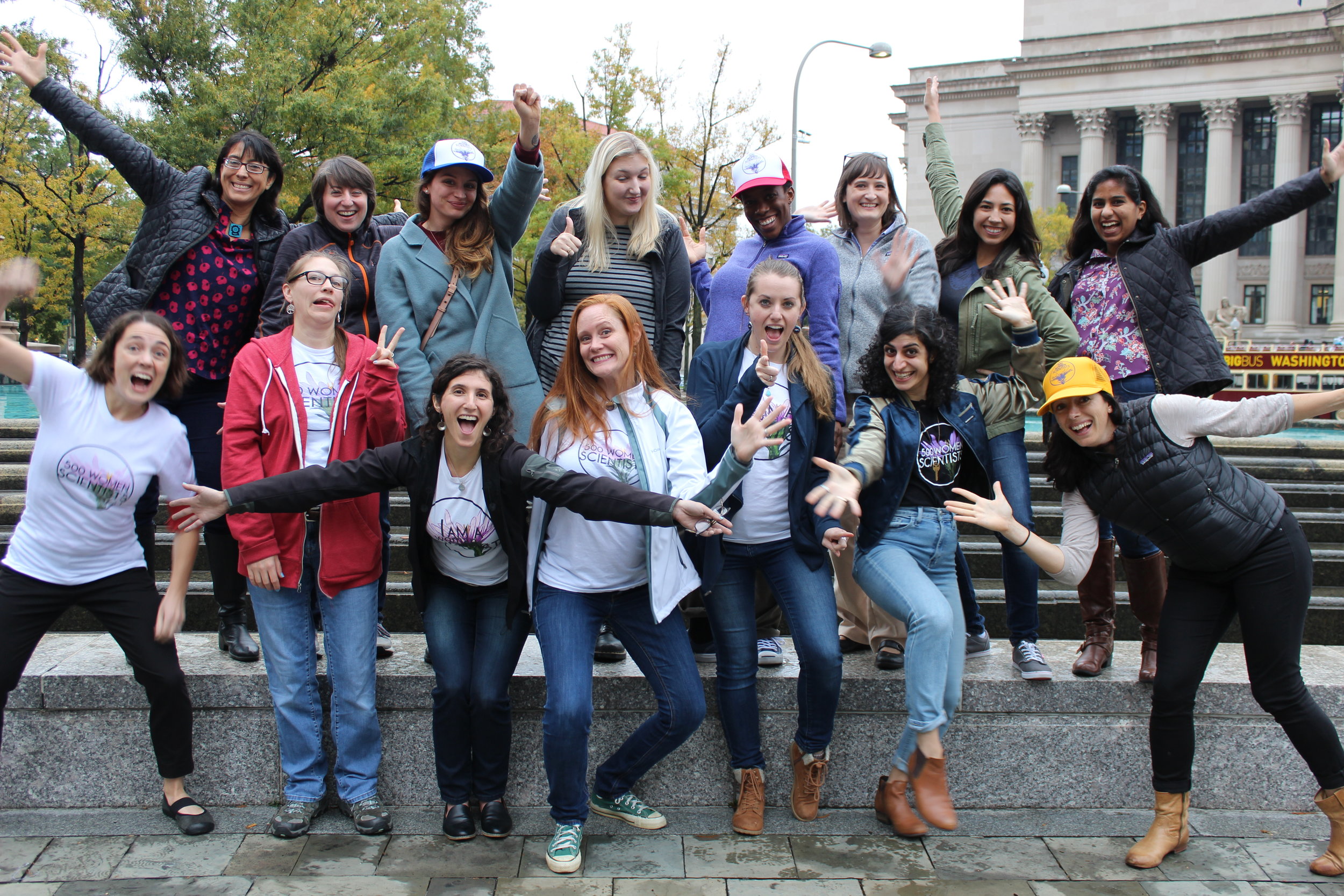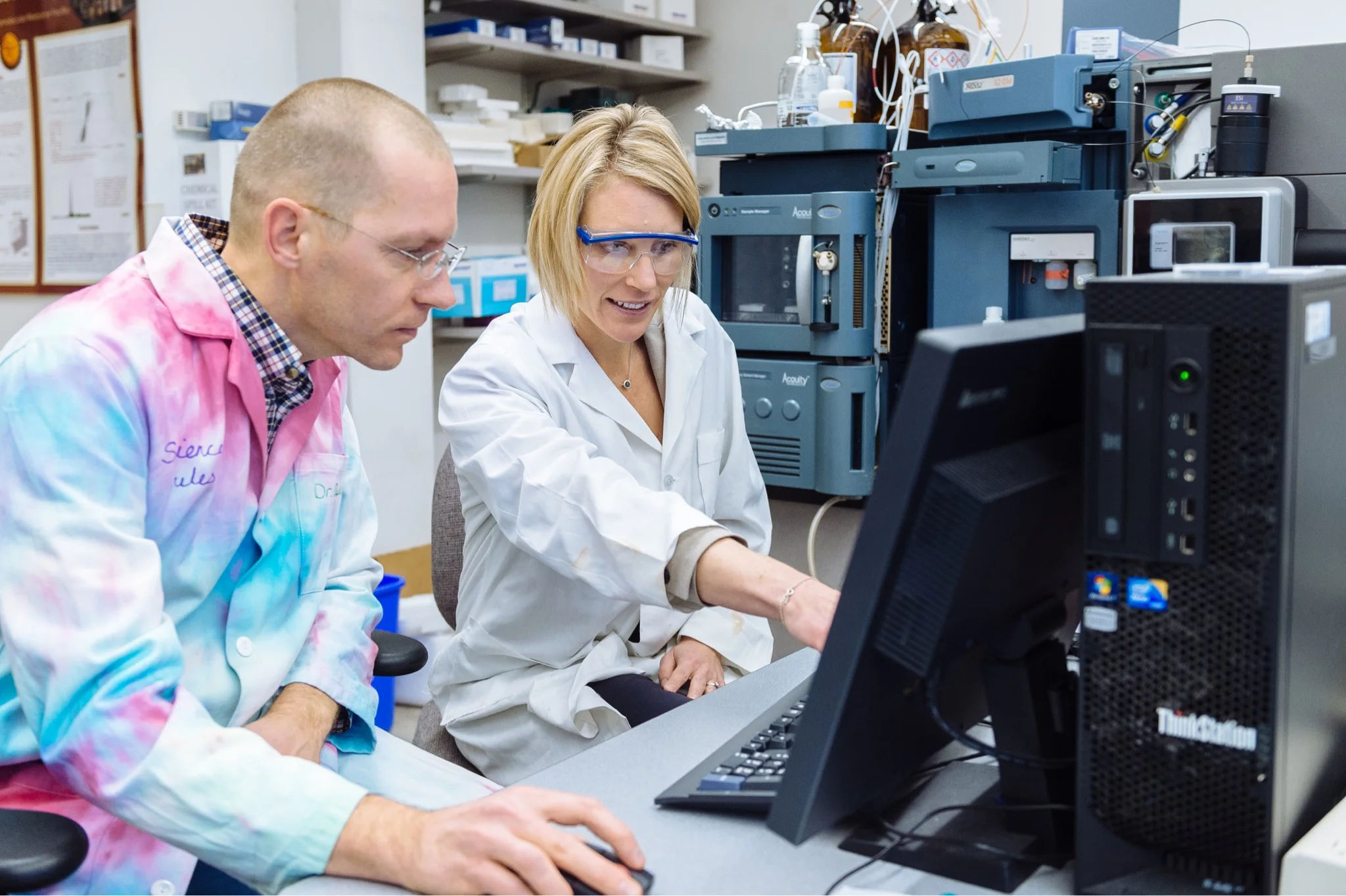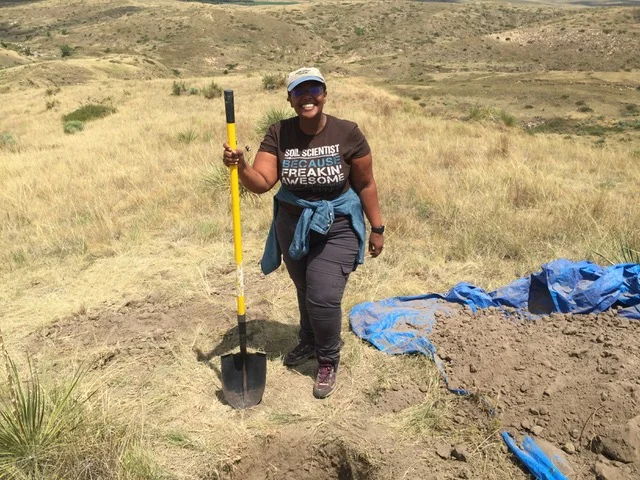One year ago, 500 women scientists (and many more) signed a pledge to declare our support science and all minorities, immigrants, people with disabilities, and LGBTQIA. That pledge grew into a mission to make science open, inclusive, and accessible. As an organization, 500 Women Scientists is committed to providing opportunities for leadership and an inclusive space for all voices and points of view. So as we celebrate our 1 year anniversary, we invite you to meet some of our organization's leadership team and learn what inspired them to join the cause. We always welcome new ideas, voices, and energy, so please get in touch if you feel similarly inspired to step up and help lead our growing organization.
Speaking up, with evidence
This week on #meetascientist, get to know Dr. Jessica Prenni, Associate Professor and Director of Proteomics & Metabolomics Facility at Colorado State University. A few weeks ago, Jessica co-authored a study on gender diversity based on an analysis of the American Society for Mass Spectrometry's annual meeting, so we thought it'd be a great opportunity to share her findings and her story!
Take Action Tuesday
This week, we seek to follow the example of Governor Scott, who has asked Florida universities and colleges to provide out of state tuition waivers and discounts to students from Puerto Rico. We encourage everyone reach out to your Governor and local college/university president and ask for similar consideration for these students in need.
Where hurricane displaced college students can get tuition breaks in Florida:
Staying in the Game
This week on #MeetAscientist get to know Dr. Asmeret Asefaw Berhe, a Professor at University of California Merced leading a soil biogeochemistry research group. She shares the arc of her career — from Eritrea to California, from political ecology to biogeochemistry — and her advice to young investigators. We know you'll find her insights as enlightening as we do!
Science that Empowers
This week on #meetascientist, get to know urban ecologist and environmental justice advocate Tiffany Carey. As a young scientist and community organizer, Tiffany has a fresh perspective on how scientists can work with communities to empower and educate. She currently does just that as a Science Outreach Coordinator at University of Michigan. We know you'll find her story and her insights to be inspiring.
Take Action Tuesday
#weekly_action
The #fundUSAscience campaign has launched! Take 2 minutes to tweet today to help bring attention to science funding as the FY2018 budget negotiations get underway.
1) Tell us how your science benefits society and add #fundUSAscience @500wsDC and a picture (sample tweets and instructions here).
2) Time to revive our habit of calling our elected officials - get in touch with your elected official and let them know what you think about science funding, DACA, or any other topic.
How to have a productive call with your representative - http://www.ucsusa.org/action/phone-calls.html#.Wa7uoNOGMn0
To defend DACA, a list of resources from United We Dream and The National Immigration Law Center:
Support bipartisan legislation that protects immigrant youth: Ask your legislators to co-sponsor S.1615 in the Senate and H.R. 3591 in the House. Check out Indivisible for more information on these bills and scripts to call your legislators.
Join United We Dream’s Day of Action: There are protests all across the country and you can find one or register your own action here. We encourage all who are able to show up and stand with Dreamers.
Read about the impact of DACA: The law has allowed people to work and attend school without the constant fear of deportation. Read first-hand stories of DACA from the National Immigrant Law Center and share with family members and friends who may not understand or support the law.
If you’re a DACA recipient: click here for reliable information from United We Dream and the National Immigrant Law Center on your rights.
Communicating science in everything
Scientist, conservationist, and artist Kika Tuff shares her work at the intersection of science, art, and outreach. She's managed to escape being pigeonholed, seamlessly bridging the worlds of science and art. She now runs a science communication agency called Impact Media Lab after finishing graduate school.
A seat at the table
Take Action Tuesday
“If you’re not outraged, you’re not paying attention”
We write this week’s action with a heavy heart. Our guest writer for the week is 500 WS leader Rukmani Vijayaraghavan who lives in Charlottesville, VA and works at the University of Virginia. Here is a message from Rukmani:
"I woke up on the morning of Saturday August 12, angry about the white supremacists scheduled to invade my city. The evening before, they’d marched on the University I work at. I went to bed sleepless that night, heartbroken by the tragedy of a terrorist attack on the street corner half a block from my apartment -- the corner I drive through every single day and have crossed on foot a hundred times. This has not been an easy weekend nor will the coming days and weeks. But the support we have received from across the country and around the world has been overwhelming -- keep it coming, and keep fighting for what is right and just."
Heather Heyer was a 32 year old woman who did what was morally right, who stood up against white supremacy, bigotry, and hatred. And she died for it. Two state troopers tragically died while simply doing their jobs -- trying to keep the people safe. Let us honor their memory and legacy.
We’re all angry, confused, and outraged. We should be. Here is what we can do this week. As many have said, if this not who we are as a country, then let’s prove it.
The first step in action is to educate ourselves and the people closest to us about what happened leading up to the incidents over the weekend:
This statue is the symbol of hatred at the center of the controversy.
The petition to remove the statue was started by a high school student, Zyahna Bryant; let her be our inspiration.
Charlottesville is a city where a veneer of gentility and progressivism often covers over decades of slavery and segregation. The University of Virginia where the marches began on Friday, was founded by Thomas Jefferson, and is also in the process of confronting its own history of slavery and segregation. More background reading here: Why this happened in Charlottesville
Some more reading: What to do about Charlottesville, White Feelings: 0-60 for Charlottesville
There are no easy solutions or actions, but there are many in Charlottesville doing the work of confronting and dealing with the legacy of racism and segregation and would greatly benefit from your support,
Like the Jefferson School African American Heritage Center. You can support them here.
Here are local groups and chapters you can support: Black Lives Matter Charlottesville, Charlottesville NOW, Charlottesville Pride, the Charlottesville-Albemarle NAACP, Habitat for Humanity of Greater Charlottesville, Planned Parenthood South Atlantic, and more here.
Support the Black Student Alliance at U.Va. They are on the frontlines.
Source unknown, but an excellent list of things you can do. And this one’s from Mashable.
Still feel like this is not enough? We are scientists, and we are far from perfect. So be creative and push yourself and your community to find more ways to stand up against hatred and bigotry in your community
Listen to Charlottesville’s protest songs
Find out what your members of Congress are doing to respond to the Charlotteville terror attacks.
Connecting science back to humanity
Take Action Tuesday
#weekly_action - In this week’s actions, we fight for science on multiple fronts.
1) Join Federation of American Societies for Experimental Biology (FASEB) for a special webinar Aug 3rd 2p EDT update on the status of the budget discussions on Capitol Hill, review new tools and materials available from FASEB, and offer tips on how to get other scientists engaged in advocacy.
2) Concerned by the new FL bill allowing challenges to school text book material? This is an excellent op-ed opportunity! Reach out to us if you are interested in writing an op-ed and would like support.
http://www.npr.org/2017/07/31/540041860/new-florida-law-lets-residents-challenge-school-textbooks
3) Does the nomination of Sam Clovis to the top science position at the USDA puzzle you? Us too. We encourage everyone to reach out to your elected officials about this topic.
Storytelling, central to human experience
Take Action Tuesday
#weekly_action
We suggest an outward and inward action this week.
1) Outward - Contact your senator today and let her/him know your opinions about health care. https://www.senate.gov/senators/contact/%3C/senators_cfm.cfm?State=CO.
Want to know more about how to make a difference as a scientist? http://www.faseb.org/Science-Policy-and-Advocacy/Become-an-Advocate/Advocacy-Tool-Kit.aspx
2) Inward - Reach out to your pod and join our summer of op-eds! Anyone interested in writing an OpEd about health care, science funding, or science-informed policy?There are two great webinars (7/27, 7/28) this week to help you make a writing plan!
https://500womenscientists.org/500ws-summer-of-opeds/
Efficient Beneficence
A Balancing Act
This week on #meetascientist, we get to know Emily Lescak, a member of the 500 Women Scientists leadership and coordinator for our Alaska pod. True to the 500WS mission, Emily has centered outreach and mentorship over the course of her career development. We're thrilled to share her research, outreach activities, and insights into the (surmountable) challenges facing women in STEM.











